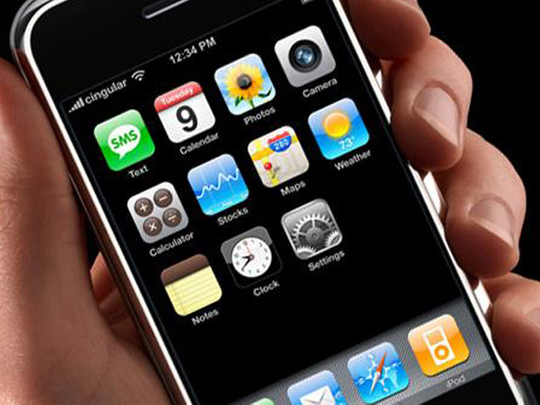
In 2007, Apple brought its characteristic style and innovation to the smart phone market with the launch of the iPhone. The device also doubles as a music player and hand-held computer that can be customised with downloadable applications. Image Credit: Gulf News Archive
Dubai: When international media revealed the iPhone's ability to track and store users' movements, it sent users into a panic across the world. But the initial discovery of this potentially invasive feature was made at Zayed University (ZU).
The original discovery was made at the Advanced Cyber Forensics Research Laboratory at ZU in Abu Dhabi in June 2010, researchers at the university say. This was approximately a year before it was revealed to the media.
The tracking feature was found as part of a master's research dissertation on cyber security done by then ZU student, Mona Badr, with Dr Ebrahim Baggili, director of the cyber forensics lab at ZU as her research supervisor.
"When I first heard the news I immediately thought I should have gone to the media with it because we'd known about it for so long," said Dr Baggili. "It wasn't information we really prioritised in the research because I had plans to use it for something else.
He added that when the news broke, his internet research led him back to their original research paper entitled: iPhone 3GS forensics: Logical analysis using Apple iTunes backup and utility. Dr Baggili and Mona's research paper was published in the Small Scale Digital Device Forensics Journal, last year. It is an online journal for academics and practitioners to publish research and is based out of Purdue University. The research revealed iPhone user information is backed up on the device as well as on their laptops when the mobile phone is synchronised with iTunes.
Backing up evidence
The iPhone geo-location tracking discovery is but one element backed up and stored by the mobile device.
"When you back up an iPhone you're essentially backing up everything in terms of contacts, call history, e-mails, messages etc...and the geo-location is just one of the files stored," said Dr Baggili. "A lot of people back their data up on a personal computer or laptop, which is very similar to what we do in digital forensics as that data then becomes digital evidence."
Digital forensics deals with extracting digital evidence in a scientific and legal way to be used in criminal and cyber investigations. He added although nobody knew about the storage of such information, which could be perceived as a breach of privacy on Apple's behalf, such information could be crucial to criminal and cyber investigations.
"The privacy issue is debatable...but when the discovery went public, Apple came back and said they'd made changes to the operating system that would no longer collect such data," he said. Dr Baggilli did not, however, re-conduct the research to verify the changes.
"Technically, it was a breach of privacy on Apple's part, but from a law enforcement perspective this stuff is digital evidence."
Dr Baggili added the digital evidence stored on the mobile device and laptops would undoubtedly have to be seized and acquired through the proper police channels.
"When we back up our digital information like pictures, website bookmarks and cookies, telephone contacts and browsing history this information is important for evidential reasons," he said. "Eventually we wanted to take the iPhone research and push it out as a project to help investigators worldwide."
Instead, Dr Baggili has used the research findings along with his expertise to work as a consultant in a UK digital forensics company called Forensics2020, a positive initiative he believes is helping export knowledge from the UAE and the Arab region.
Exporting knowledge
"At the end of the day we discovered something here in the UAE people in other countries are making use of through the software developed because of it," said Dr Baggilli. "We could have done that all here if we simply applied our research…a practice people in this area of the world lack."
ZU is now working on dedicating a part of its operations to the commercialisation of research projects to boost the UAE's position as a knowledge exporter.
"Rather than importing everything, through the discoveries being made here we can export our research and knowledge…all we need is motivated researchers and people to work hard," he said.












